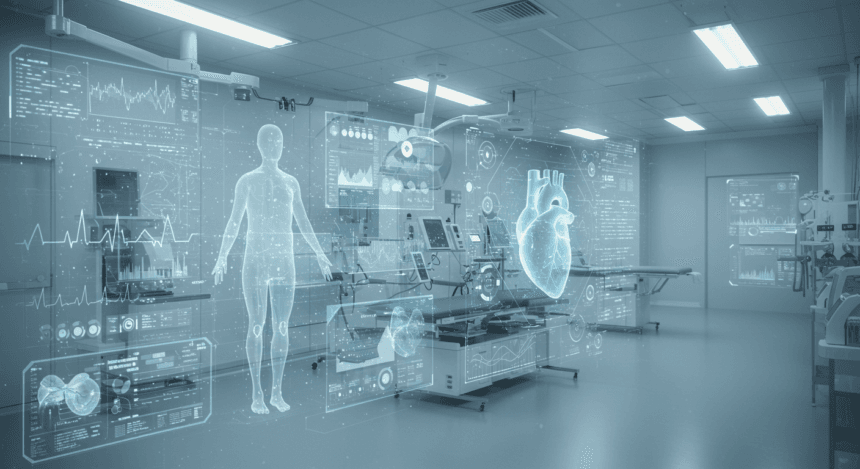Artificial intelligence (AI) is reshaping industries around the globe, and medicine is no exception. From accelerating diagnostics to personalizing treatment plans, AI is transforming the way healthcare providers deliver care and improving outcomes for patients. By automating complex processes, uncovering patterns in data, and assisting with decision-making,
AI is helping healthcare systems address some of their biggest challenges. In this article, we will explore how AI is impacting various facets of medicine, including diagnostics, treatment personalization, drug discovery, patient engagement, and administrative efficiency.
AI in Diagnostics and Early Detection
One of the most exciting applications of AI in medicine is its ability to enhance diagnostic accuracy and speed. Machine learning algorithms and Large Language Models, trained on vast amounts of medical data, are now capable of identifying diseases at early stages—sometimes even before symptoms manifest. For example, AI tools in radiology can analyze imaging scans to detect cancers with a level of precision comparable to or exceeding that of human radiologists.
AI-powered diagnostic tools are also revolutionizing areas like pathology and ophthalmology. Algorithms are being used to analyze tissue samples for signs of abnormalities, enabling faster and more consistent diagnoses. Similarly, AI tools like Google’s DeepMind have demonstrated remarkable accuracy in identifying eye diseases from retinal scans. These advancements not only improve patient outcomes through earlier detection but also help reduce the workload for clinicians.
Personalized Medicine and Treatment Plans
AI is a cornerstone of the growing field of precision medicine. By analyzing a patient’s genetic profile, medical history, and lifestyle factors, AI can identify the most effective treatments for individual cases. This personalized approach contrasts with traditional medicine, where treatments are often standardized across large populations.
For example, in oncology, AI algorithms analyze genomic data to predict patient outcomes and which therapies are likely to be most effective for a specific type of tumor. Similarly, AI tools are being used to predict how patients will respond to medications, reducing the trial-and-error approach that often delays optimal treatment.
AI also plays a role in monitoring patients with chronic conditions. By analyzing data from wearable devices and electronic health records, AI can help clinicians adjust treatment plans in real-time, ensuring patients receive the right care at the right moment.
Enhancing Provider Efficiency with AI
In addition to its clinical applications, AI is making significant strides in improving the efficiency of healthcare providers. One standout example is the use of AI medical scribes. Documentation and administrative tasks account for a substantial portion of a clinician’s workload, contributing to burnout and reducing the time they can spend with patients.
AI medical scribes use Large Language Models to generate comprehensive clinical notes based on patient-provider sessions. These tools can automatically extract relevant information, such as symptoms, diagnoses, and treatment plans, and populate electronic health records (EHRs) accurately. There are also specialty-specific scribes such as Medwriter.ai which provides AI Psychiatry Scribe Software to mental health practitioners. By automating this process, AI scribes allow providers to focus on patient care rather than documentation.
The impact of AI scribes is profound. Studies have shown that they can reduce documentation time significantly, leading to higher job satisfaction among healthcare providers. Furthermore, AI scribes can improve the accuracy and consistency of medical records, which enhances patient safety and facilitates better coordination of care.
AI in Patient Engagement and Self-Care
Beyond assisting healthcare providers, AI is empowering patients to take a more active role in their health. AI-driven chatbots and virtual assistants can provide patients with information about their conditions, guide them in managing symptoms, and remind them to take medications or attend appointments. These tools are particularly valuable in chronic disease management, where ongoing support is critical for maintaining health.
AI is also making mental health care more accessible. AI-powered apps like Woebot and Wysa use cognitive-behavioral therapy techniques to help users manage anxiety and depression. While these tools are not a replacement for professional therapy, they offer an accessible and affordable option for individuals who may not have immediate access to mental health services.
Wearable devices equipped with AI capabilities could be another game-changer in patient engagement. From tracking physical activity and sleep patterns to monitoring vital signs like heart rate and oxygen levels, these devices could provide real-time data that patients and their providers can use to make informed health decisions. For example, AI algorithms can analyze data from wearable ECG monitors to detect irregular heart rhythms, prompting timely medical intervention.
Accelerating Drug Discovery and Clinical Trials
Drug discovery is a time-consuming and expensive process, often taking years and costing billions of dollars to bring a new treatment to market. AI is revolutionizing this process by identifying promising drug candidates more efficiently.
AI has already played a pivotal role in the development of treatments for diseases like COVID-19. During the pandemic, AI tools were used to model the structure of the virus, identify potential drug candidates, and optimize vaccine design. By streamlining the early stages of drug development, AI has the potential to bring life-saving treatments to patients faster.
The Future of AI in Medicine
The potential of AI in medicine is vast, and we are only beginning to scratch the surface. Future advancements may include real-time decision support systems that assist clinicians during surgeries, AI-powered robots capable of performing minimally invasive procedures with unmatched precision, and advanced algorithms that predict disease outbreaks and guide public health responses.
AI also has the potential to address global health disparities. By providing low-cost diagnostic tools and virtual care options, AI can improve access to quality healthcare in underserved regions. For example, AI-powered smartphone apps are being used to diagnose skin conditions and detect eye diseases in remote areas with limited access to specialists.
While the journey to fully integrating AI into healthcare comes with challenges, including the need for robust data infrastructure and clinician training, the benefits far outweigh the hurdles. By embracing AI, the medical community can enhance efficiency, improve patient outcomes, and create a more sustainable healthcare system.
Conclusion
AI is revolutionizing medicine across the board, from diagnostics and treatment personalization to drug discovery and patient engagement. Among its many applications, AI medical scribes stand out as an example of how technology can enhance provider efficiency and improve the quality of care. As AI continues to evolve, it promises to not only transform the practice of medicine but also make healthcare more accessible, personalized, and effective for everyone.
The future of medicine is here, and it is powered by AI. By leveraging this groundbreaking technology responsibly and innovatively, we can create a healthier, more equitable world for all.








